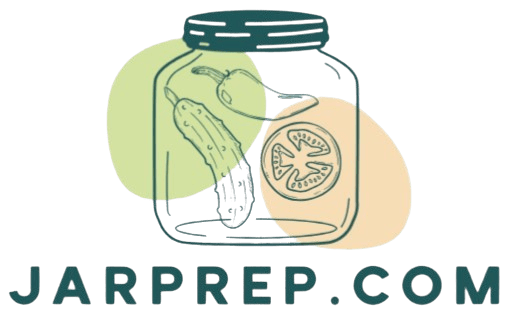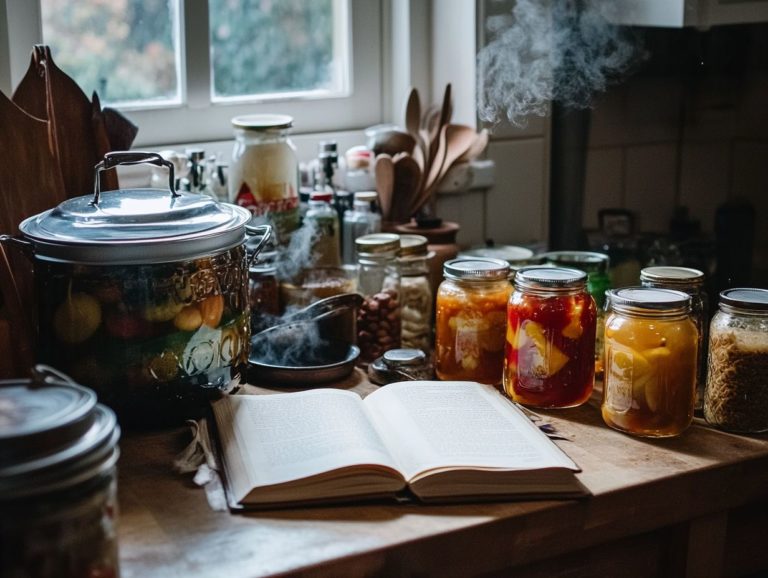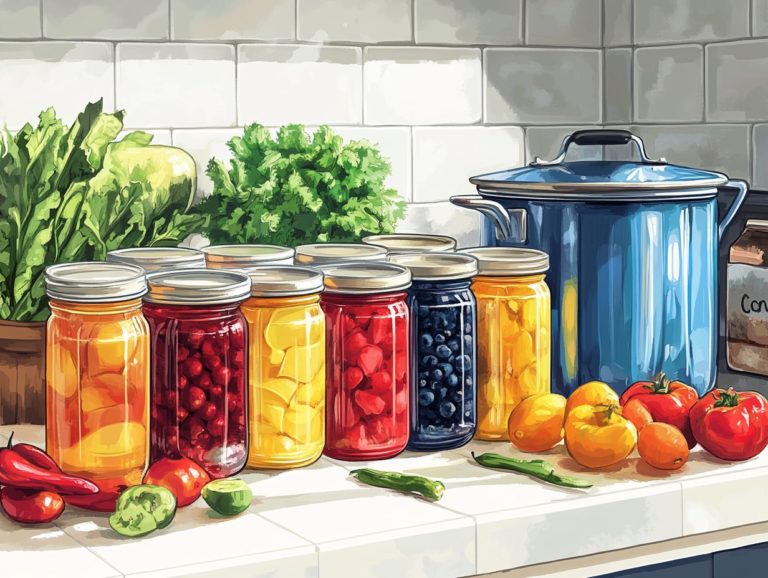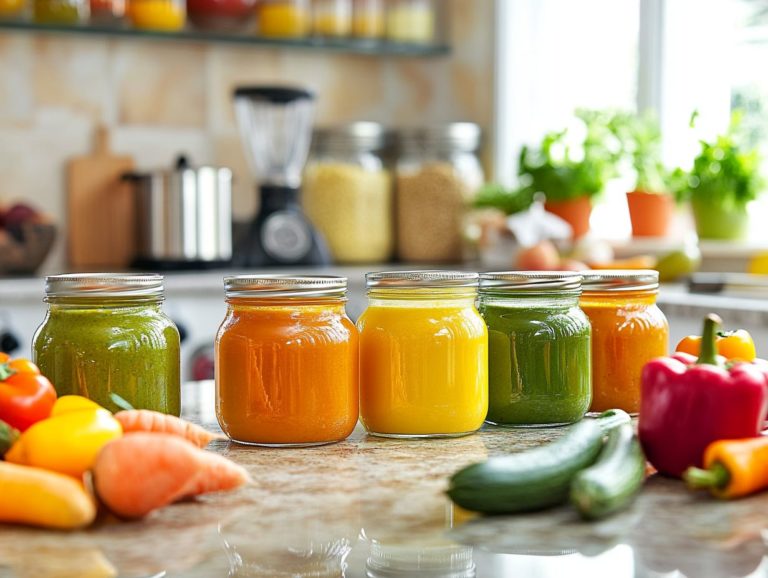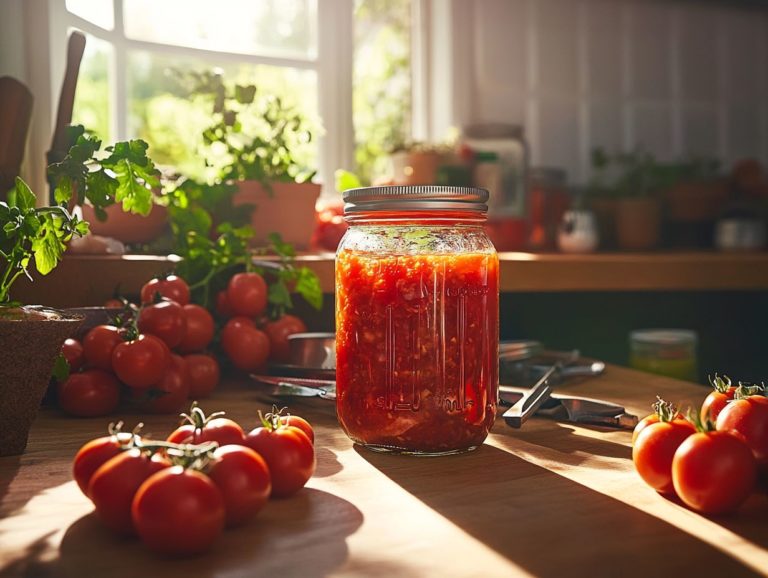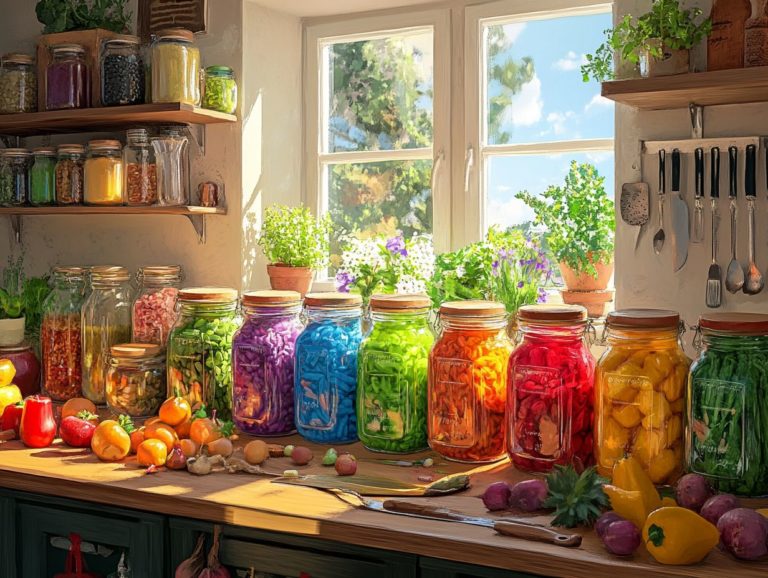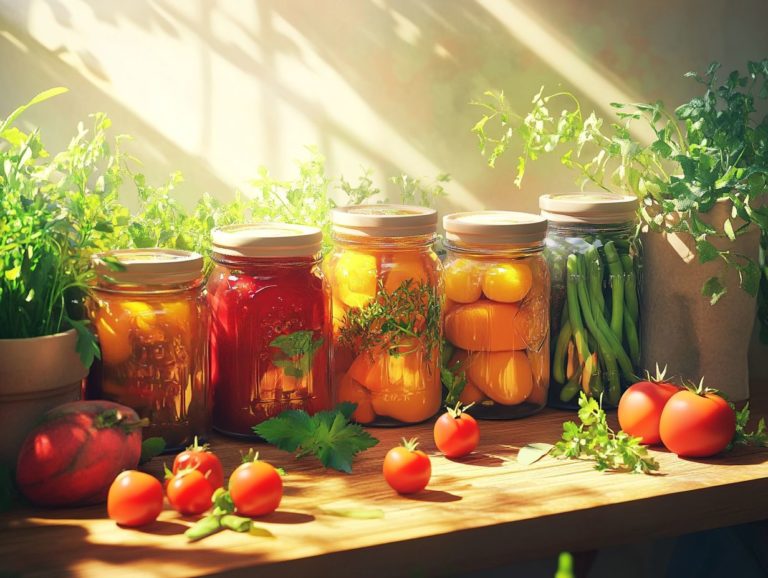How to Make Your Own Canned Soups
Homemade canned soups provide you with convenience and a delightful, nutritious option for your pantry.
Explore the benefits of crafting your own soups, where you’ll discover not only cost savings but also endless customization possibilities.
You ll find all the essential equipment and ingredients you need, along with a comprehensive step-by-step guide for canning.
Learn how to tailor your recipes and seamlessly incorporate these delicious soups into your meals.
Important safety precautions are outlined to ensure your canning experience is enjoyable and secure.
Contents
- Key Takeaways:
- Benefits of Homemade Canned Soups
- Essential Equipment and Ingredients
- Step-by-Step Guide to Canning Soups
- Tips for Customizing Your Canned Soups
- Using Canned Soups in Recipes
- Safety Precautions for Canning Soups
- Frequently Asked Questions
- Is it safe to can soups at home?
- How long can I store my canned soups?
- Can I add meat to my canned soups?
Key Takeaways:
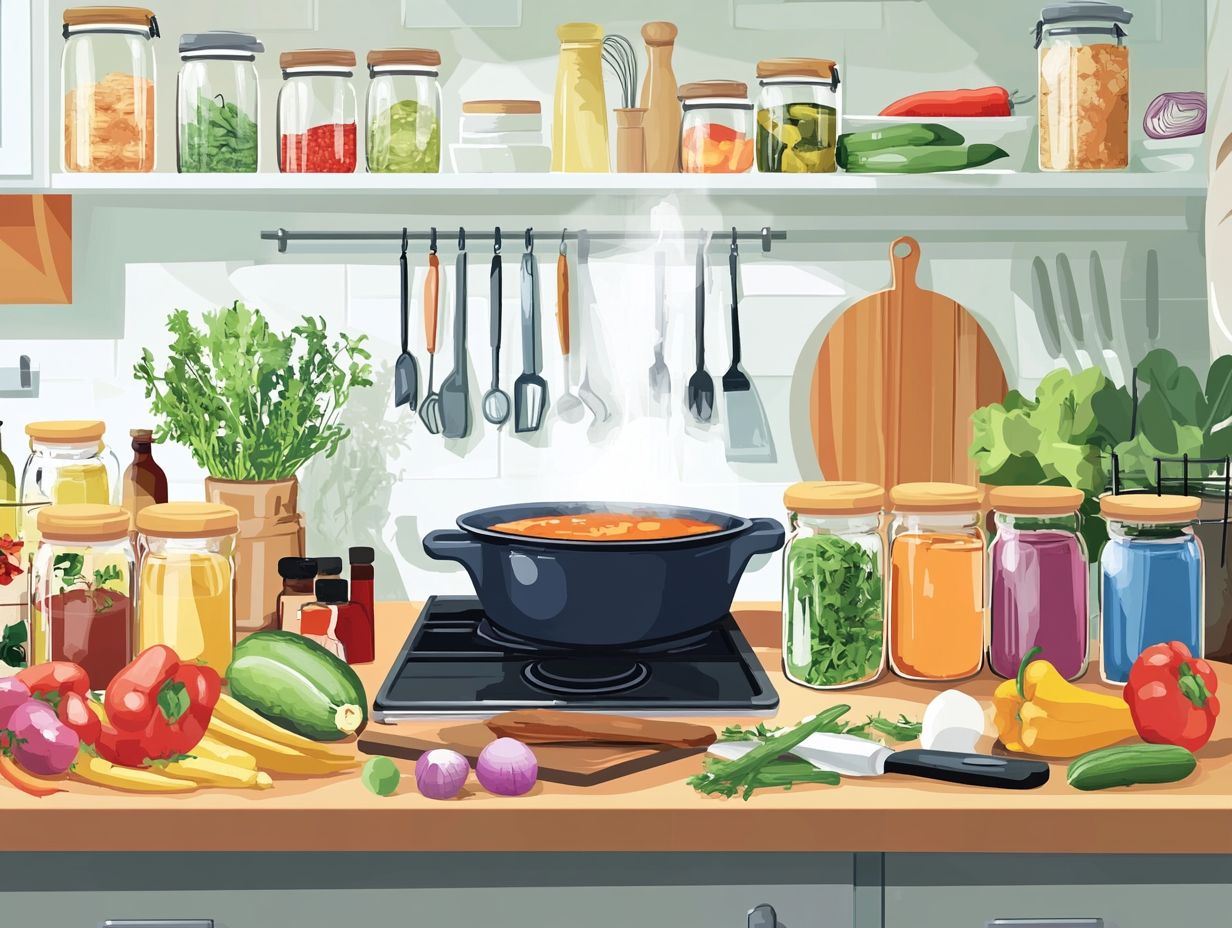
- Homemade canned soups are cost-effective, customizable, and healthier than store-bought options.
- Essential equipment and ingredients for canning soups include jars, a canning pot, and fresh ingredients.
- To ensure safety, follow proper canning techniques and experiment with different flavors and recipes when making your own canned soups.
Benefits of Homemade Canned Soups
Homemade canned soups offer many benefits that elevate your culinary pursuits while helping you save food and reduce waste.
By crafting your own soups, you have full control over the ingredients, guaranteeing rich flavors and optimal nutrition while minimizing waste. This approach enables you to customize recipes to fit your family’s tastes and provides convenient, ready-to-eat meals for those hectic days.
By using seasonal vegetables and fresh herbs, you capture their peak flavors and nutrients for future enjoyment. The canning process enables you to create a variety of soups, from comforting chicken soup to vibrant vegetable broth, ensuring a diverse menu throughout the year.
Why Make Your Own Canned Soups?
Creating your own canned soups offers the convenience of ready-to-eat meals while granting you full control over flavor and nutritional content.
By preparing soup at home, you can craft unique blends tailored to your taste preferences whether that means spicing things up with extra heat or incorporating seasonal vegetables for a refreshing twist.
This approach elevates the taste and amplifies health benefits, as you can choose high-quality, wholesome ingredients free from preservatives and excess sodium.
The chance to experiment with different recipes ignites your culinary creativity, transforming ordinary meals into delightful, personalized dishes that meet your dietary needs and desires. With every bowl, you make a nourishing choice that reflects your unique palate.
Essential Equipment and Ingredients
To embark on your journey of canning homemade soups, it s essential to gather the right equipment and high-quality ingredients that will ensure safe and effective preservation.
You’ll need primary tools like pressure canners, which are crucial for processing low-acid foods such as meat broth and vegetable soup. Don’t forget about jars specifically designed for canning; they provide the airtight seal essential during the canning process.
Understanding the canning instructions is just as important for maintaining safety and quality, especially regarding heat penetration and avoiding any risks associated with Clostridium botulinum. By selecting the right ingredients fresh vegetables, aromatic herbs, and flavorful broth bases you ll enhance the taste and boost the nutritional value of your canned soups.
What You’ll Need for Canning Soups
To successfully can soups, gather specific canning jars, pressure canners, and essential tools for safe food preservation.
Choosing the right jars is crucial; wide-mouth mason jars are typically your best bet for soups, as they make filling and cleaning a breeze. A pressure canner is essential for processing low-acid foods like meats and certain vegetables. It maintains the high temperatures necessary to eliminate harmful bacteria. Tools such as funnels minimize mess when pouring soup into jars, while jar lifters allow you to safely handle hot containers, reducing the risk of burns.
When preparing soups loaded with beans, tomatoes, and chicken stock, using proper techniques ensures that each jar is sealed tightly for long-term storage.
Don t wait! Start preserving today! Dive into the world of homemade soups and start your canning adventure now!
Step-by-Step Guide to Canning Soups
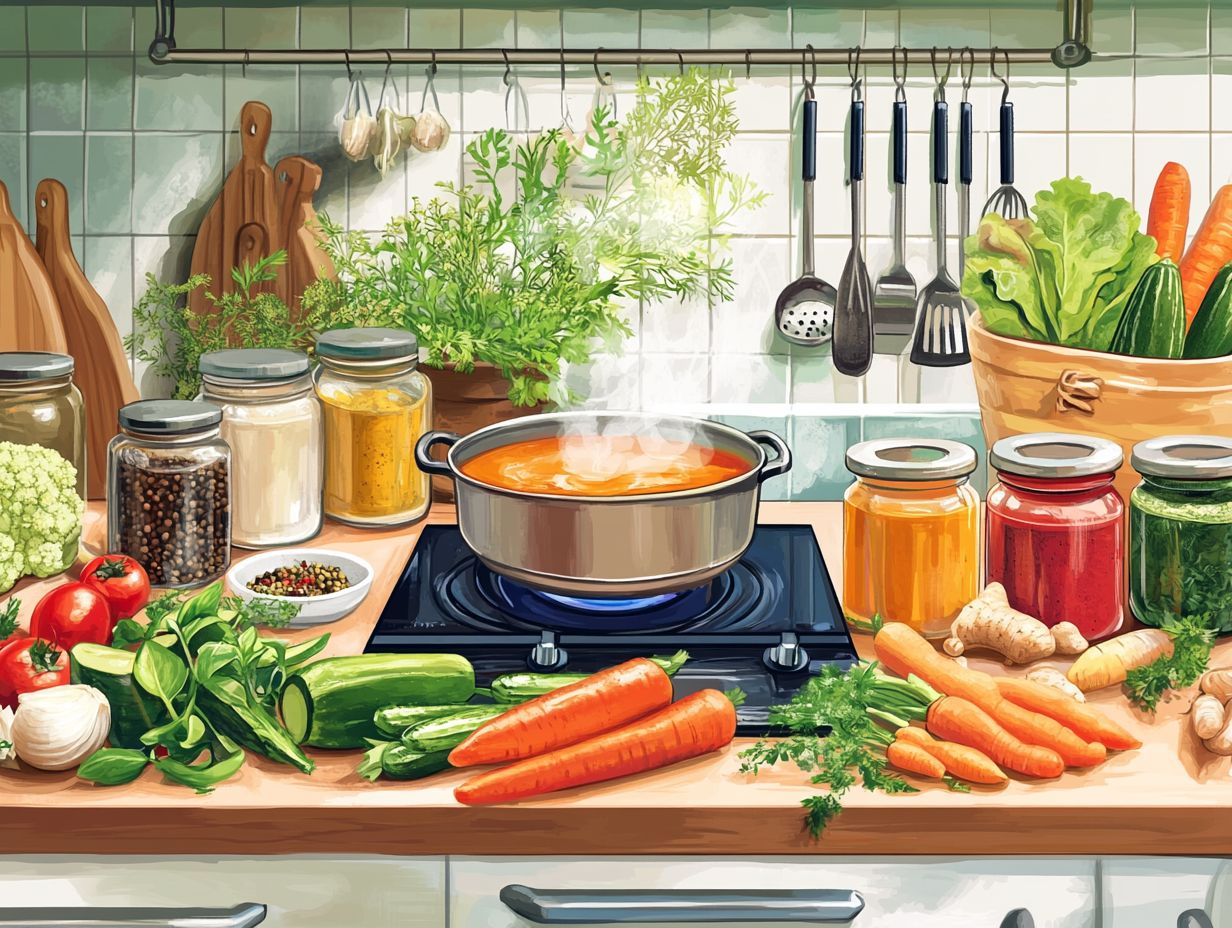
The step-by-step guide to canning soups elevates your culinary efforts. It ensures that your homemade creations are safely preserved and primed for future enjoyment.
Start by crafting your soup with high-quality ingredients and a flavorful broth. Take care to boil your vegetables properly for that perfect, cohesive texture.
Once your soup reaches its ideal flavor profile, it s vital to adhere to the canning instructions meticulously.
Filling the jars correctly while leaving adequate space at the top is key to achieving a proper seal. After you ve filled the jars, the next step is processing them in your pressure canner, a pot designed to can food at high temperatures. This critical step ensures that heat gets to every corner, keeping your soup safe and delicious!
Preparing and Cooking the Soup
Preparing and cooking the soup is an important step. It helps craft rich flavors and achieve the perfect consistency before canning.
Understanding the various cooking methods is key to creating a soup that truly delights your palate. Whether you re boiling fresh vegetables to draw out their natural sweetness or simmering ingredients slowly to develop a deep, flavorful broth, each technique adds its own unique touch to the dish.
Choosing high-quality ingredients is crucial, as they significantly impact the taste and texture of your final product. Fresh herbs, ripe tomatoes, and premium stocks can elevate an ordinary soup into something extraordinary, transforming the entire experience.
Canning and Storing the Soup
The canning and storing phase requires your utmost attention as you fill and seal jars to preserve the essence of your homemade soups.
Begin by selecting jars that are free of cracks and thoroughly cleaned; this step is important for a successful process.
As you fill the jars, remember to leave about an inch of headspace this allowance is vital for accommodating expansion during processing.
After ladling the soup into the jars, use a bubble remover to eliminate any pesky air pockets, ensuring a reliable seal.
Don t overlook wiping the rims clean before placing the lids on; even the slightest residue can jeopardize the integrity of the seal.
Once you ve securely fastened the metal bands, it s time to process the jars either through a water bath or a pressure canner, depending on the recommended processing time for soups.
For the best results, store your jars immediately in a cool, dark, and dry area. This keeps your flavors rich and your food safe for enjoyment over time.
Tips for Customizing Your Canned Soups
Customizing your canned soups invites you to infuse personal touches that resonate with your tastes and preferences. This ensures each jar is not just a meal but a reflection of your culinary flair.
Whether you lean towards a robust chicken soup or a vibrant vegetable medley, the versatility of recipes enables you to explore a myriad of flavors and ingredient pairings. By incorporating high-quality ingredients, such as fresh herbs and spices, you can elevate your soups from mere sustenance to gourmet masterpieces.
Consider adding distinctive elements like varied soup bases, proteins, or seasonal vegetables to enrich both the nutrition and flavor of your creations.
Adding Personal Touches to Your Recipes
Adding personal touches to your canned soup recipes can elevate traditional dishes into something uniquely yours.
By embracing your creativity in the kitchen, you can easily adjust flavors to match your palate perhaps a splash of lemon juice for brightness or a dash of hot sauce for a delightful kick.
Experimenting with fresh ingredients like herbs or seasonal vegetables can lead to a more vibrant and hearty outcome. Don t overlook texture; incorporating croutons can introduce a satisfying crunch that enhances the entire experience.
These simple yet impactful changes can significantly elevate your soup, transforming a basic bowl into a comforting masterpiece, rich in flavor and character.
Using Canned Soups in Recipes
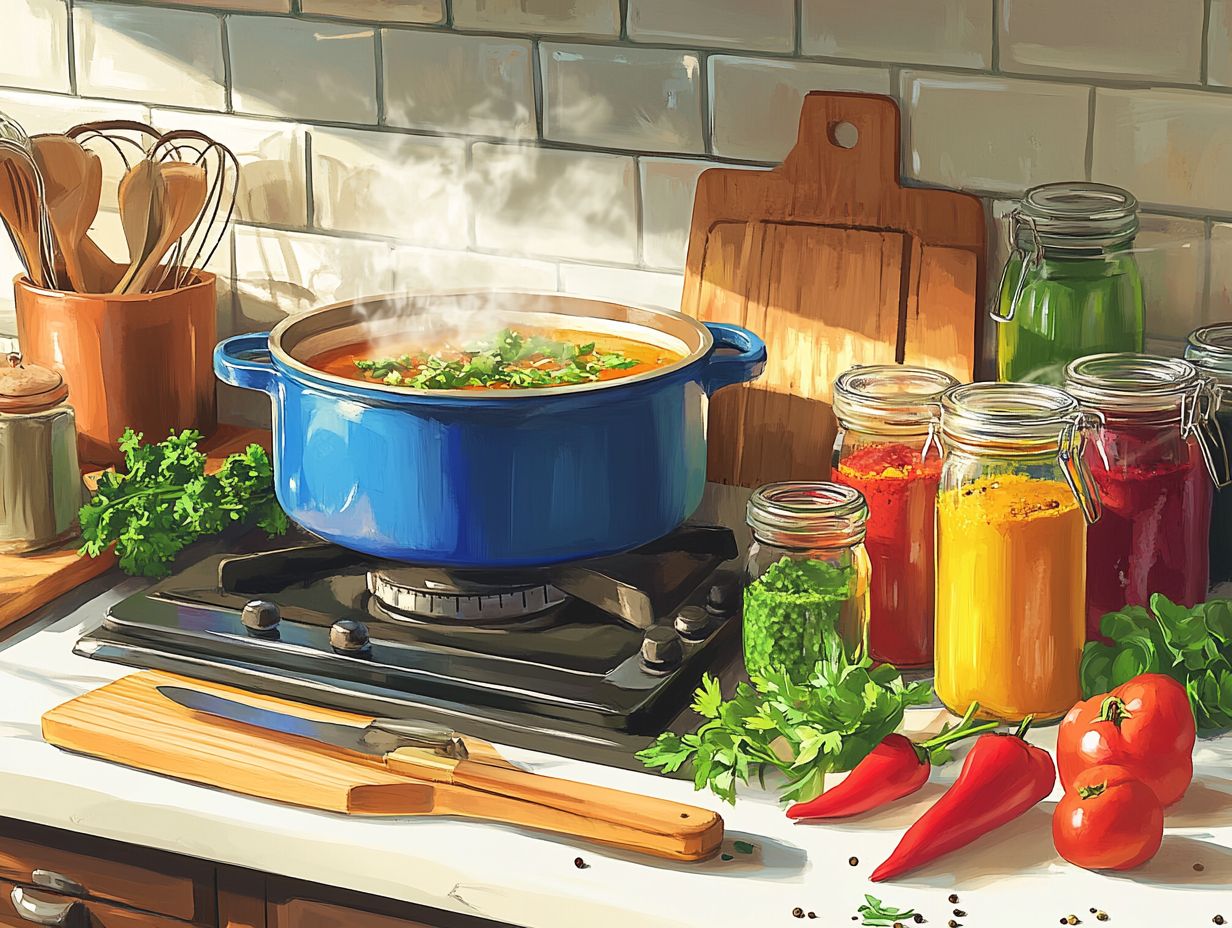
Canned soups offer a versatile foundation for countless recipes. They transform meal preparation into a quick and effortless task, perfectly suited for your busy lifestyle.
From robust chicken soup to savory vegetable broth, these canned delights serve as a quick ingredient in a variety of dishes. This enables you to craft delicious meals with minimal exertion.
Whether you choose to use canned soups as a starter, made with high-quality ingredients, in casseroles, or even as a base for sauces, their adaptability ensures they integrate smoothly into your cooking routine. Plus, the extensive selection of soup varieties means you’ll always discover something to enhance any meal, elevating both flavor and nutrition.
Incorporating Canned Soups Into Meals
Incorporating canned soups into your meals unveils a realm of culinary creativity, transforming ordinary dishes into delightful feasts.
With their rich flavors and effortless preparation, these soups elevate your everyday meals to something truly special, all without the associated hassle. For instance, imagine crafting a creamy chicken and rice casserole using a can of condensed cream of mushroom soup. This simple addition brings a luscious texture that keeps the dish hearty and satisfying.
Alternatively, you can whip up a savory vegetable stew by blending various canned soups, enhancing both flavor and nutrition with ease. Utilizing these soups as a base for broth and homemade sauces can invigorate your pasta dishes or provide a flavorful glaze for roasted vegetables, showcasing how seamlessly they integrate into your daily cooking routines.
Safety Precautions for Canning Soups
Ensuring food safety during the canning process is absolutely vital. Improper techniques can expose you to foodborne illnesses, including those associated with Clostridium botulinum.
To mitigate these risks, it’s critical for you to adhere strictly to canning guidelines and embrace established safety tips throughout the entire process. This means employing proper pressure canning methods, which involves using special equipment that helps safely preserve low-acid foods, maintaining impeccably clean workspaces, and diligently checking jar seals after canning.
Moreover, understanding heat penetration and processing times is essential for effectively eliminating harmful bacteria.
Proper Handling and Storage Techniques
Proper handling and storage techniques can make all the difference in preserving your delicious soups!
To keep these culinary delights in prime condition, it s essential to store the jars in a cool, dark space, away from direct sunlight and fluctuating temperatures. A well-organized pantry or dedicated storage area is ideal for preserving those rich flavors and essential nutrients.
Staying vigilant is key; periodically checking the seals on your jars can help prevent spoilage and ensure they re safe for consumption. Keeping an eye on expiration dates and using FIFO (first in, first out) methods will also elevate your food preservation practices.
By following these guidelines, you can enjoy your homemade or store-bought soups with complete peace of mind.
Frequently Asked Questions
What equipment do I need to make my own canned soups?
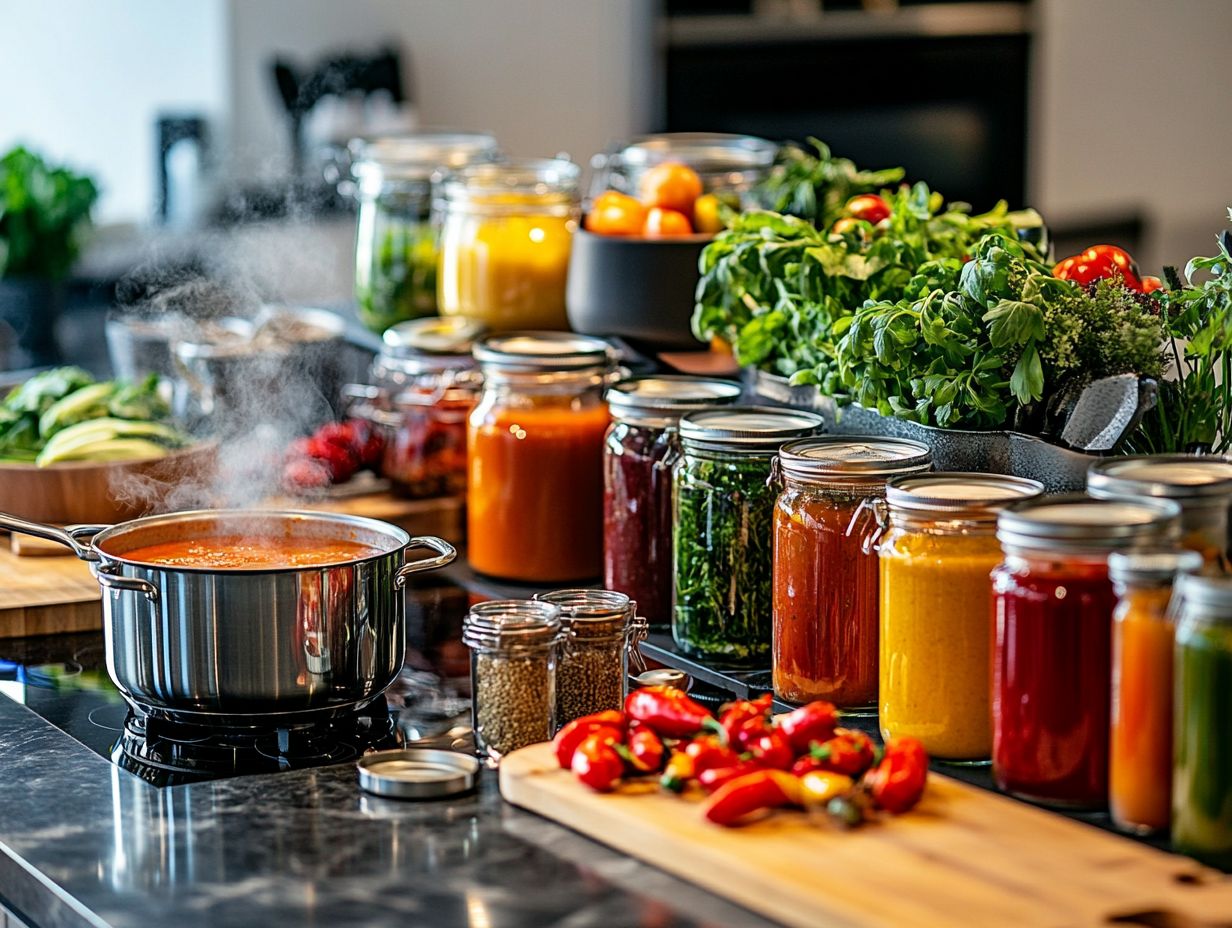
To make your own canned soups, you’ll need a large pot for cooking, canning jars and lids for storage, a canning funnel, a jar lifter, and a pressure canner.
Can I use any type of vegetables in my canned soups?
Yes, you can use any type of vegetables in your canned soups, including vegetable broth. It is recommended to use fresh, ripe vegetables for the best flavor and texture.
How do I prepare the vegetables for canning?
To prepare the vegetables for canning, wash them thoroughly and chop them into small, uniform pieces, ensuring proper boiling vegetables techniques are followed. Then, blanch them in boiling water for a few minutes before adding them to the soup.
Don’t wait! Start exploring recipes with canned soups today!
Is it safe to can soups at home?
Absolutely! You can safely can soups at home if you follow the right canning steps and use proper equipment.
Make sure to sterilize all your tools and carefully stick to the canning process to keep your soups safe and tasty.
How long can I store my canned soups?
Canned soups can stay fresh for 1-2 years if you keep them in a cool, dark spot.
Always check the expiration date on the lids and throw away any cans that look spoiled.
Can I add meat to my canned soups?
Yes, you can add meat to your soups! Just cook the meat thoroughly before mixing it in.
Follow the recommended processing times for canning meat to ensure everything is safe and delicious.
